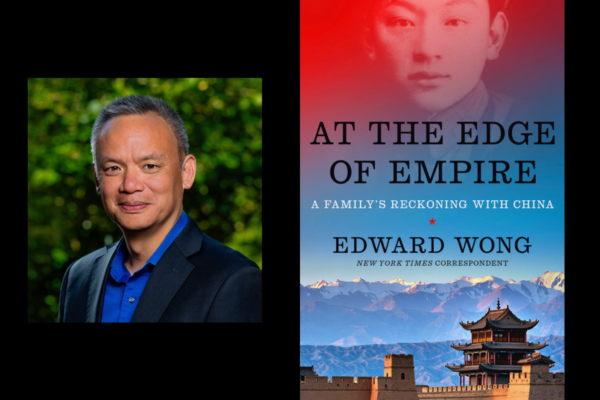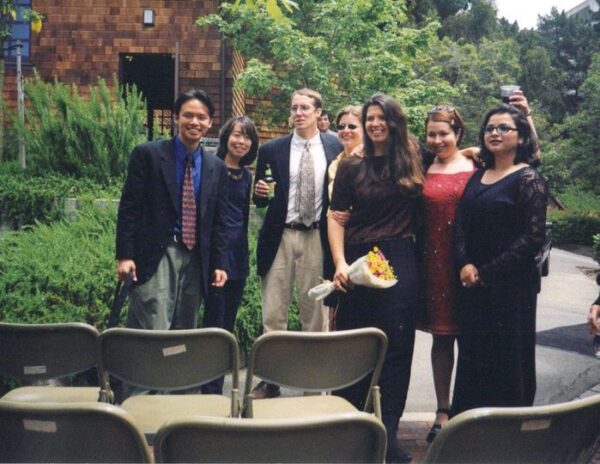 Edward Wong (’98) has reported on international news for The New York Times for more than 25 years, work that has taken him to nearly 100 countries. A diplomatic correspondent, Wong’s career at the venerable newspaper includes covering the war in Iraq and serving as the Beijing bureau chief.
Edward Wong (’98) has reported on international news for The New York Times for more than 25 years, work that has taken him to nearly 100 countries. A diplomatic correspondent, Wong’s career at the venerable newspaper includes covering the war in Iraq and serving as the Beijing bureau chief.
The winner of the Livingston Award for international reporting and part of a team of Pulitzer Prize finalists, Wong has appeared on television and radio outlets, including PBS, NPR, and BBC, to speaks on global issues.
He will be speaking at the Logan Multimedia Center on Thursday, Oct. 17 about his new book, “At the Edge of Empire: A Family’s Reckoning with China,” a J-School event presented in partnership with the UC Berkeley alumni Chinese Chapter. The book weaves Wong’s compelling family’s story with China’s history and provides insight into how China evolved into the country it is today.
Wong, who lives with his family in Washington, DC, tells us about his years at the J-school, what he does on his off-time, what he hopes the future holds — and also gives some advice to students preparing to launch their journalism careers.
Question 1: What memories do you hold from your time studying at the J-school?
Outside of the obvious answer — lifelong friendships — I’ll name three courses.
First, J-200 with Bill Drummond. Anyone who went through his Marine-style boot camp knows why I’m mentioning this. I learned lessons from it that have remained relevant throughout my career at The New York Times. When I meet other Drummond alumni, we always talk about our time in this course.
The year-long documentary course taught by Jon Else. I’ve always loved film, and this gave me an opportunity to try my hand at making one. I managed to get distribution for my short thesis film, which was partly about my father’s time in the People’s Liberation Army under Mao. That planted the seeds for my book, in which I would delve into his story in much greater detail two decades later.
The Hong Kong reporting course that I took with Carolyn Wakeman. Orville Schell, who had recently started as the school’s dean, also played an important role as a spiritual guide. We studied the history of Hong Kong, then traveled to the city in the weeks of the historic transition from British to Chinese rule. It was deeply personal for me — to see the city from which my parents had immigrated for the first time, to meet family members there. The trip also gave me the opportunity to be a foreign correspondent, writing stories for The Los Angeles Times, San Francisco Chronicle and others. The experience was so important to me that I wrote an entire chapter about it in my new book.

J-School Graduation Day in 1998 for students in Bill Drummond’s J-200 class: Edward Wong, Yuki Takagaki, John Lyons, Lesli Maxwell, Bonnie Eslinger, Michelle Goldberg and Macarena Hernández.
Question 2: Is there a particular off-campus spot that you remember fondly from your time in Berkeley?
My life revolved around the north side of campus. There was Top Dog and Brewed Awakening, which sadly closed in 2022. But my favorite place remains Tilden Park. It’s magical, especially at sunset. I went hiking, biking and running there. These days, whenever I visit Berkeley, I try to go up there.
Question 3: What do you enjoy doing when you have free time?
I live in the neighborhood of Mt. Pleasant in Washington, D.C., which is the most “Berkeley” that the nation’s capital gets. I like running and biking in Rock Creek Park, and I go see films at the AFI theater in Silver Spring, Maryland. I’m trying to learn to cook a wider range of dishes, and hopefully I’ll have more time for that now that I’ve finished my book.
Question 4: What advice do you have for someone just starting their journalism career?
Become an expert in whatever topic and type of medium you’re most interested in. Decades ago, journalism was about being a generalist. And the training model and career path encouraged that. But the industry has changed. Experts with deep knowledge and skills in particular areas get more respect in newsrooms now and are able to seize more opportunities.
Question 5: What’s next (big or small) on your to-do list?
Spending more time with my daughter, who’s about to turn 12. Maybe we’ll write a book together! I’d also like to work on projects in mainly visual or audio media, such as films and podcasts. I’ve churned out many words since leaving J-school 25 years ago, and I’d like to explore new realms of storytelling.
